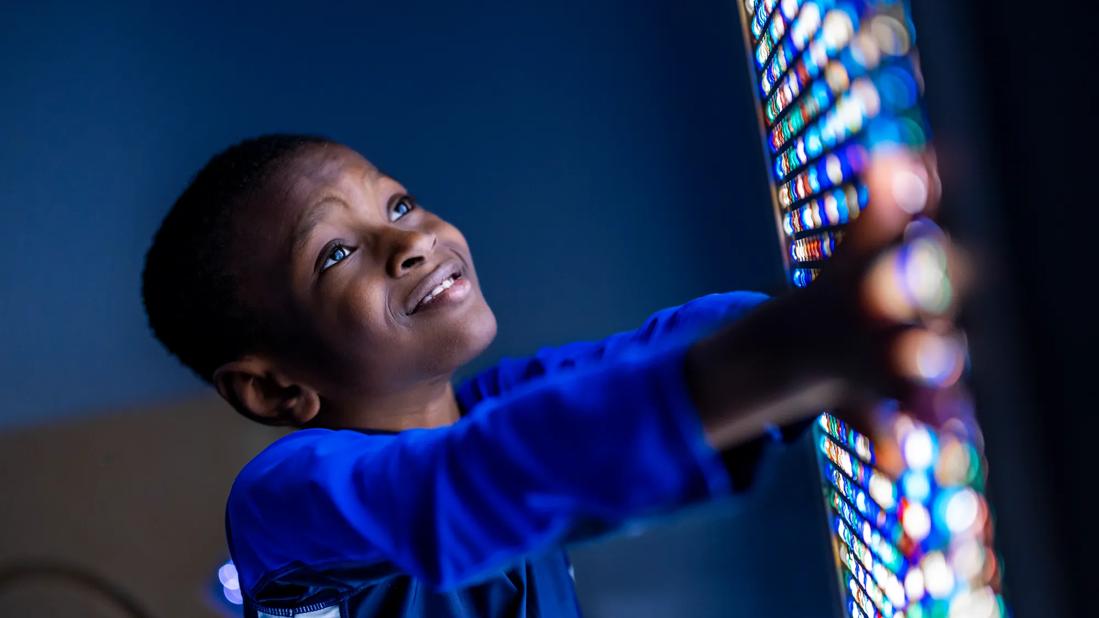Researching chronic feeding and sleep problems

Image content: This image is available to view online.
View image online (https://assets.clevelandclinic.org/transform/8f9cdd47-7c93-47f5-b2f3-fd1bd099661c/CCC_5582209_02-27-25_0312_AMO)
Autism
Since becoming director of Cleveland Clinic Children’s Center for Autism in June 2018, Cynthia Johnson, PhD, has expanded the Center’s research program with two new federally funded studies focusing on addressing sleep problems and comparing intensive behavior therapies in young children with autism. Dr. Johnson and colleagues just recently completed a study on the treatment of feeding problems.
Advertisement
Cleveland Clinic is a non-profit academic medical center. Advertising on our site helps support our mission. We do not endorse non-Cleveland Clinic products or services. Policy
“Many children with autism are very selective about their foods, sometimes to a point that their food choices are reduced to only a few, which puts them at risk of nutritional deficiencies,” says Dr. Johnson. “Sleep is another aspect of daily life that frequently needs attention. If children are not getting adequate quality sleep, then they are not able to benefit fully from therapeutic interventions provided to them.”
Dr. Johnson’s focus in both of these areas is on early intervention.
“Our interventions aim to prevent feeding and sleep issues from turning into chronic problems through parent training and engagement,” she says. “We know that oftentimes we can make quick improvements in sleep, but expanding a child’s diet and improving their mealtime behavior is typically a slower process.”
In collaboration with researchers from the University of Rochester, she recently published a study assessing the impact of an 11-session parent training intervention for feeding. The study stems from her earlier work at the University of Florida and serves as the foundation of her ongoing research at Cleveland Clinic.
“During those 11 sessions, parents worked with a therapist who provided guidance on how to best influence their child’s eating habits and increase their overall compliance through preventive approaches, systematic exposure to new foods and a carefully-selected reward system,” explains Dr. Johnson.
The feeding problems addressed in the study include food selectivity, food refusal and disruptive mealtime behaviors.
Advertisement
“This intervention proved successful in improving children’s food acceptance, as well as reducing parental stress levels and building their confidence,” she says. “In cooperation with our collaborators from the University of Rochester we are planning to conduct a larger-scale study that will investigate the association between food selectivity and sensory differences, which are often seen in children with autism.”
In the area of sleep, Dr. Johnson plans to conduct a study that will compare the efficacies of two parent-focused programs — the Sleep Parent Training program (SPT) and the Parent Educational Program (PEP) — both delivered via Cleveland Clinic Express Care, in 90 children with autism with moderate or greater sleep disturbance. In addition, the study aims to evaluate the impact of both programs on child and parent quality of life through measurable parameters such as child daytime behavior, parental stress and confidence, and mental health.
“The main difference between the SPT and PEP programs is that the training program provides parents with practical tools and suggestions for improving the child’s bedtime routine, such as self-soothing techniques, while PEP provides useful information about their child’s diagnosis and information about accessing services for their child,” explains Dr. Johnson. “In an earlier pilot trial, we already observed favorable outcomes with the manualized behavior parent training program for parents.”
The 4-year study is funded by a $1 million award from the Department of Defense (DOD) and is expected to start recruiting patients in November 2018. One of the unique aspects is the planned video delivery of the intervention.
Advertisement
“Both programs will be delivered in five sessions via the telehealth platform, which allows us to reach more families and gives more scheduling flexibility,” says Dr. Johnson. “With this approach, we will be able to coach the parents at a time that is convenient for them, such as at dinnertime or right before the bedtime routine.”
She is optimistic that this study will also inform clinicians about the utility of telehealth in delivering similar interventions.
The second recently funded study directed by Dr. Johnson is a multi-site study focused on comparing early intensive behavior intervention (EIBI) with less intensive, time-limited applied behavior analysis (ABA) intervention in children with autism.
“This is a comparative effectiveness study of the two behavior interventions which will start recruiting patients sometime after the New Year,” says Dr. Johnson. “We are looking to determine how the two levels of intervention compare.”
The primary goal of the 6-month study is to compare the key child and parent outcomes at three different timepoints – after 24 weeks of intervention, at the 24-week follow-up visit, and at 5 years of age. The study is funded by a $7 million award from DOD and plans to recruit a total of 130 children across the collaborative network, of which 26 will be enrolled at Cleveland Clinic.
Advertisement
Advertisement
Findings hold lessons for future pandemics
One pediatric urologist’s quest to improve the status quo
Overcoming barriers to implementing clinical trials
Interim results of RUBY study also indicate improved physical function and quality of life
Innovative hardware and AI algorithms aim to detect cardiovascular decline sooner
The benefits of this emerging surgical technology
Integrated care model reduces length of stay, improves outpatient pain management
A closer look at the impact on procedures and patient outcomes